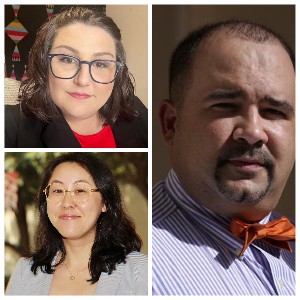
The Muskie School of Public Service is delighted to welcome three new faculty to our community. We start this academic year with two new tenure track faculty, Dr. Nichole Fournier and Dr. David Lowry, in the Geography-Anthropology program and one new tenure track faculty in Tourism & Hospitality, Dr. Forest (Xiao) Ma.
Dr. Nichole Fouriner is a broadly trained Anthropologist whose work spans Biological Anthropology and Bioarchaeology. She received a PhD in Anthropology from Washington State University in August 2020, a MA in Forensic Anthropology/Bioarchaeology from North Carolina State University in 2013, and a BA in Biological Anthropology and Public Health from Boston University in 2011.
Her research program broadly focuses on the impacts of environmental change and other stressors (e.g., social inequality, transnational cultural encounters, pathogenic load) on human morphological, life history, and health variation. She addresses these questions using skeletal, stable isotope, and ancient DNA data. Her work has thus far largely focused on Indigenous populations from the San Francisco Bay Area, specifically the Ohlone nation.
Nichole is originally from Fitchburg, Massachusetts. Her education and her work have taken her all over the country, but she is a New Englander at heart. She is very happy to join the USM community and build a home in Maine.
Dr. David Shane Lowry is an anthropologist and member (citizen) of the Lumbee Tribe of North Carolina. He grew up in the Lumbee community in Robeson County, North Carolina. In 2022-2023, he was Visiting Senior Fellow in the School of Social Policy at Brandeis University. In 2021-22, he was Distinguished Fellow in Native American Studies at MIT. In this role, David led a new conversation at MIT about the responsibilities of MIT (and science/technology education, more generally) in the theft of American Indian land and the dismantling of American Indian health and community.
Since 2013, David has lectured across the United States – roles in which he has become well versed in conversations at the intersection of Native America, race, and science/health. His first book, titled Lumbee Pipelines: American Indian movement in the residue of settler colonialism (under contract with University of Nebraska Press), explores American Indian utilization of colonial conditions to create opportunities that are both uplifting and oppressive. He is beginning a second book with MIT Press titled Indigenous MIT: why we must save science and technology from American genocide. David is a graduate of MIT (SB) and UNC-Chapel Hill (MA and PhD). His graduate work was funded by the National Science Foundation Graduate Research Fellowship (NSF-GRF). At University of Southern Maine, David is leading IRL (Indigenous Relationships Lab) as a place for and commitment to
mattering of American Indian and other Indigenous peoples from Maine, to Massachusetts, to North Carolina. David writes and hosts conversations on InTrust: https://indigenouspeoplestrust.org
Dr. Forest Ma is assistant professor in the Tourism and Hospitality program at the University of Southern Maine. She has previously served as an instructor at the University of South Carolina and The Hong Kong Polytechnic University. Before joining academia, she held several managerial positions in international hotels and non-profit/private event organizations. Bringing her industry experience, she has taught a wide range of hospitality management courses, including restaurant management, beverage operations, human resource management, event planning, and more. She also enjoys guiding students to engage and serve underprivileged communities through study abroad courses.
Her research focuses on food and beverage operations, looking at practical approaches to create memorable experiences for both employees and customers. She has published in top-tier hospitality and tourism journals, including International Journal of Hospitality Management, International Journal of Contemporary Hospitality Management, and International Journal of Tourism Research.

